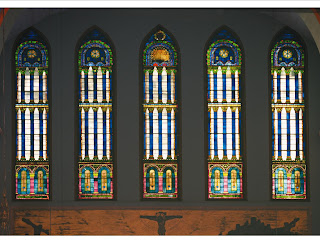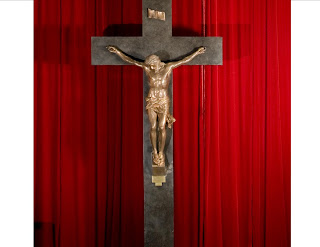Today’s Gospel [Matthew 25:14-30] reports one of the last parables of Jesus’ public life. In the liturgical context of these final weeks of the Church’s annual cycle, we apply this (and similar parables) to ourselves, as we anticipate Christ’s second coming to judge the living and the dead at the end of history.
This particular parable portrays two good and faithful servants, who successfully invested their master’s money and returned a good profit, justifying their master’s investment in them. There is also a third, wicked, lazy servant, who seems somewhat timid, someone perhaps preoccupied with caution above all else, who hid his master’s money in a hole in the ground.
Now, obviously, in our ordinary day-to-day world, caution in economic matters is usually a good idea. These parables, however, are not about providing practical advice on how to invest one’s money (assuming one has money to invest, which for many in Jesus’ audience might not have been the case, any more than it may be for most people in our world today). But, of course, these parables are not about our ordinary day-to-day world at all, but about the kingdom of God. And, in the kingdom of God, the two good and faithful servants are praised and rewarded, and the wicked, lazy servant is condemned – clearly for his failure to actually accomplish anything, but maybe even more for his fear of failure, and for the inexcusable inactivity and passivity his excessive caution produced.
The successful servants were prudent in their own way (which turned out in the end to be the right way). Presumably, they also knew that their master was demanding. But, (like the fear of the Lord, which, as the psalm says [Psalm 128:1-5], makes people blessed), their master’s expectation that they accomplish something with what he had given them, his determination to hold them to account and to judge them accordingly, far from immobilizing them, instead inspired them actually to do something bold with the resources entrusted to them. We all know that in real life all sorts of people, of whom not much is ordinarily expected (like the Ron Weasley character in Harry Potter), when suddenly pressed to take responsibility, when put in a position that challenges them to do something, often respond unexpectedly well, succeeding in ways above and beyond whatever was stereotypically expected of them.
Of course, since this is a parable primarily about the kingdom of God, the master’s expectations of his servants seem obviously intended to suggest God’s expectations of us – expectations which, when the time comes to settle accounts, may end up being most threatening precisely to anyone who is determined, like the third servant, to keep life unthreatening.
To the first two, however, their master must have seemed incredibly generous. Surely, he turns out to be the most imaginative and adventurous person in the parable, the one who risks treating his servants as partners and rewards them with greater responsibility and greater closeness. So cautious, however, is that wicked, lazy servant that he fails to see what the other two see so well. He cannot see what he is being encouraged to make of his life, what he is being personally empowered to become. As Pope Francis has reminded us, it is defeatism, which stifles boldness and zeal [Evangelii Gaudium 85], whereas God’s love summons us to mission and makes us fulfilled and productive [EG 81].
So, now, with which of the servants do we identify? Whom do we see when we imagine God? How do we interpret and experience his expectations of us? Do we feel threatened, as if God were just out to get us? Do we – like the wicked, lazy servant – imagine that the challenging situations in which we find ourselves in life are more like traps God sets for us to catch us in failure to fulfill his will? Or do we recognize, in his will for us and in those challenging situations in which we find ourselves in life, an unprecedented opportunity – to live a new and abundant life of moral responsibility, and an invitation to a life of ever-increasing intimacy with God?
For those starting out on life’s pilgrimage, this parable is an invitation to make the most of the as yet uncertain challenges and opportunities that lie ahead. For those of us nearing the last stop, this parable is more like an examination of conscience, calling on s to look back over our lives, at how we have responded to those challenges and opportunities as we prepare our own answer when the Lord calls each of us to give an account of ourselves.
With which of the three do we identify? Notice that we have three possibilities here, and I for one have always been struck by the fact that the servant with the 2 talents, in terms of the resources he has to work with, actually starts out a lot closer to the wicked, lazy servant than he does to the superstar servant with the 5 talents. Like the servant with only 1 talent, the one with the 2 may seem to lack any obvious star quality or other signs of greatness. In terms of what he is willing to do with what he has been given, in terms of his outlook on life, however, the one with the 2 talents seems so much closer to the one with the 5 – and light years away from the wicked, lazy servant with only 1 talent, whose self-absorbed focus on his powerlessness, his sense of himself as a victim (how contemporary that sounds!), have turned him into someone like the person one of my professors once called a silent spectator in the story of one’s own life!
Like the three servants in the parable – and like the worthy wife, so extolled for her endeavors in today’s first reading – each one of us experiences his or her own particular set of challenges and opportunities. And, just like with the servants in the parable, the gifts God has given us to work with can be multiplied many times over by being boldly invested in one another, in getting out of ourselves and joining with others in this world, which we have been entrusted to love and care for, and in our life together as his Church, whose mission it is to share our master’s joy with that same world.
Homily for the 33rd Sunday in Ordinary Time, Saint Paul the Apostle Church, November 19, 2023.





